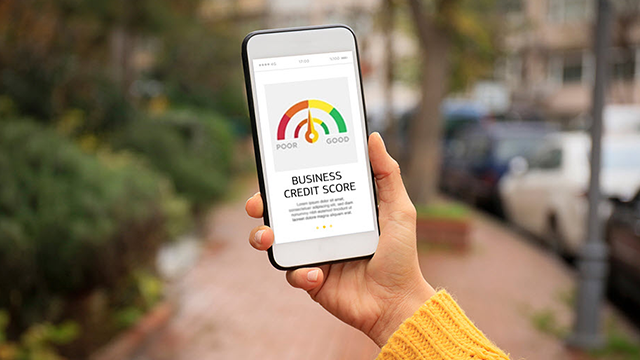A business credit profile is a characterization of your business’s credit history that establishes its ability to borrow. Your business credit score reflects your business’s creditworthiness and influences your access to credit products such as credit cards and loans. Both your credit profile and your credit score give credit agencies, lenders, vendors and suppliers an indicator of how you handle your debts and your likelihood of paying them on time. Building your business credit profile can pay off: The lending products available to small businesses include lines of credit, business credit cards, term loans, commercial real estate loans and letters of credit. Your small business banker can help you understand your options.
What is business credit and how do I build it?
October 27, 2025 | 2 minute read

Answered by
Rob Snead
Credit Products Executive
Bank of America
Why is your business credit profile important?
The ability to borrow money at the right time can help you jump on opportunities and navigate challenges. You can use credit to add to your working capital, lease equipment or vehicles, or acquire another business.
How to build a business credit profile
Your business’s ability to borrow depends on its credit profile and its credit score. Here is how to improve both:
- Apply for an Employer Identification Number (EIN) through the IRS to help separate your business and personal finances.
- Consider forming an entity such as an LLC or corporation, another step toward creating a separate identity for your business.
- Open a business bank account.
- Ask vendors such as big box home improvement and office supply stores to report your positive payment history to credit bureaus. Once you’ve built a history of paying these vendors on time, negotiate credit, such as the ability to pay them in 30 days.
- Apply for a business credit card and make on-time — or early — payments.
- Keep the percentage of the available credit you use to 30% or less. High credit utilization lowers your credit score.
- Apply for a D-U-N-S (Data Universal Numbering System) number with Dun & Bradstreet. This unique nine-digit number lets the agency track your business’s credit score. You usually don’t need to apply to the other major bureaus for them to track your business’s credit profile.
- Monitor your credit scores and reports with credit bureaus to be sure their information is accurate, and to correct any errors. A high credit score can improve your chances of getting approved for credit and may lead to a better interest rate and repayment terms.
Bottom line
Ultimately, taking a proactive approach to building your business credit profile and using the right tools can pay off, bringing better access to capital and lower interest rates.
Explore more
Get help finding the right products and services for your business
Answer a few simple questions to receive tailored business banking solutions.
Credit score basics for small businesses
To secure the credit you need at the most attractive interest rates, it helps to have a strong business credit score, which is a measure of the financial health of your company.
Important Disclosures and Information
Bank of America, Merrill, their affiliates and advisors do not provide legal, tax or accounting advice. Consult your own legal and/or tax advisors before making any financial decisions. Any informational materials provided are for your discussion or review purposes only. The content on the Center for Business Empowerment (including, without limitations, third party and any Bank of America content) is provided “as is” and carries no express or implied warranties, or promise or guaranty of success. Bank of America does not warrant or guarantee the accuracy, reliability, completeness, usefulness, non-infringement of intellectual property rights, or quality of any content, regardless of who originates that content, and disclaims the same to the extent allowable by law. All third party trademarks, service marks, trade names and logos referenced in this material are the property of their respective owners. Bank of America does not deliver and is not responsible for the products, services or performance of any third party.
Not all materials on the Center for Business Empowerment will be available in Spanish.
Certain links may direct you away from Bank of America to unaffiliated sites. Bank of America has not been involved in the preparation of the content supplied at unaffiliated sites and does not guarantee or assume any responsibility for their content. When you visit these sites, you are agreeing to all of their terms of use, including their privacy and security policies.
Credit cards, credit lines and loans are subject to credit approval and creditworthiness. Some restrictions may apply.
Merrill Lynch, Pierce, Fenner & Smith Incorporated (also referred to as “MLPF&S” or “Merrill”) makes available certain investment products sponsored, managed, distributed or provided by companies that are affiliates of Bank of America Corporation (“BofA Corp.”). MLPF&S is a registered broker-dealer, registered investment adviser, Member SIPC, and a wholly owned subsidiary of BofA Corp.
Banking products are provided by Bank of America, N.A., and affiliated banks, Members FDIC, and wholly owned subsidiaries of BofA Corp.
“Bank of America” and “BofA Securities” are the marketing names used by the Global Banking and Global Markets division of Bank of America Corporation. Lending, derivatives, other commercial banking activities, and trading in certain financial instruments are performed globally by banking affiliates of Bank of America Corporation, including Bank of America, N.A., Member FDIC. Trading in securities and financial instruments, and strategic advisory, and other investment banking activities, are performed globally by investment banking affiliates of Bank of America Corporation (“Investment Banking Affiliates”), including, in the United States, BofA Securities, Inc., which is a registered broker-dealer and Member of SIPC, and, in other jurisdictions, by locally registered entities. BofA Securities, Inc. is a registered futures commission merchant with the CFTC and a member of the NFA.
Investment products:

.jpg)
